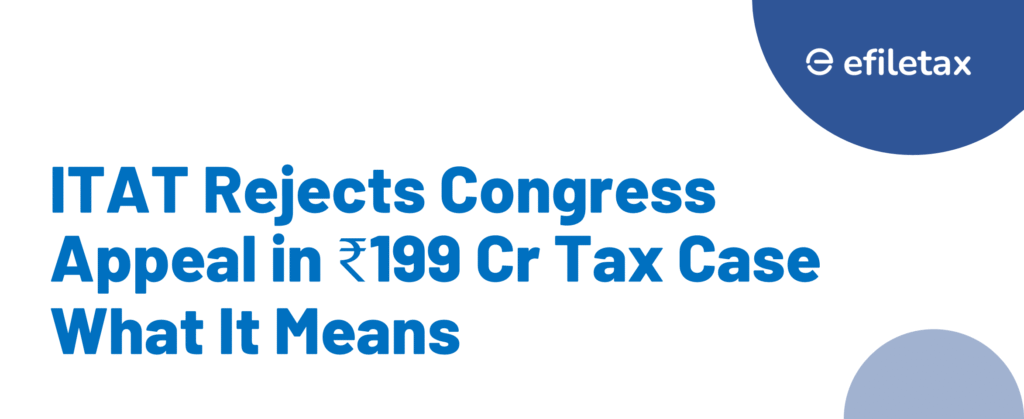
Congress ₹199 Cr Tax Demand: What the ITAT Dismissal Means
The Income Tax Appellate Tribunal (ITAT) has dismissed the Indian National Congress’s appeal against a ₹199 crore tax assessment raised by the Income Tax Department. This key ruling brings serious implications for political party taxation under Indian law and reaffirms limits on the exemptions granted under Section 13A of the Income-tax Act, 1961.
Let’s break it down.
What Triggered the ₹199 Crore Tax Demand?
- Authorities alleged that certain income sources did not qualify for exemption under Section 13A, which grants tax relief to political parties subject to conditions.
- Violations included:
- Cash donations above ₹2,000, breaching the permissible limit
- Inadequate donor disclosure
- Alleged misuse of party funds
What Does Section 13A Say?
- Accounts are audited
- No donation above ₹2,000 is received in cash
- Political party files return of income before the due date under Section 139(4B)
Failure to meet any of these conditions results in forfeiture of exemption, and the income becomes taxable at regular rates.
Why the ITAT Dismissed the Appeal
The ITAT found that:
- The party failed to maintain documentary evidence for major donations
- Large amounts were received in cash, violating the ₹2,000 cash limit
- The audit reports and disclosures were incomplete or inconsistent
The tribunal upheld the Income Tax Department’s assessment and dismissed Congress’s plea.
Key Implications of the Ruling
- Political parties must strictly follow Section 13A conditions to retain tax exemptions.
- ITAT reaffirmed that tax exemption is not automatic—it depends on compliance and transparency.
Expert View: A Wake-Up Call on Political Funding
According to CA Shyam Nair, “This order sets a benchmark. Political entities cannot claim blanket immunity. Once donations are in violation of Section 13A or lack audit trail, they lose the protection.”
Political Party Taxation: Compliance Checklist
Here’s what political parties must do to avoid losing tax benefits:
| Condition | Section Requirement |
|---|---|
| Maintain audited books | Sec 13A read with Rule 17CA |
| File return under 139(4B) | Before due date |
| No cash donations above ₹2,000 | Mandatory |
| Disclose donors over ₹20,000 | PAN + full details required |
| Separate bank account for donations | Recommended |
Can This Be Challenged Further?
Yes, the Congress party still has the option to:
- File an appeal with the High Court under Section 260A, but only on substantial questions of law
- Request condonation if there’s delay in appeal filing
- Alternatively, approach CBDT for relief—though such chances are rare for factual disqualifications
Final Words
The dismissal of Congress’s appeal by the ITAT highlights the growing emphasis on clean political funding and stringent tax compliance. Parties across the spectrum must now treat tax filings with the same seriousness as companies or trusts.
FAQs
Q1: Are political parties generally exempt from income tax?
Yes, under Section 13A, subject to conditions. Violations void the exemption.
Q2: Can political parties receive foreign donations?
Only via approved routes and under FCRA, not under Income Tax Act.
Q3: What if a donor refuses to provide PAN?
Such donations above ₹20,000 may be disallowed for exemption purposes.
Summary
ITAT dismisses Congress’s appeal on ₹199 crore tax demand. The party violated Section 13A conditions, including cash donation limits and audit norms, making its income taxable.
Need help with Section 13A compliance or tax audits?
👉 Reach out to Efiletax for expert tax support tailored to political entities and NGOs.